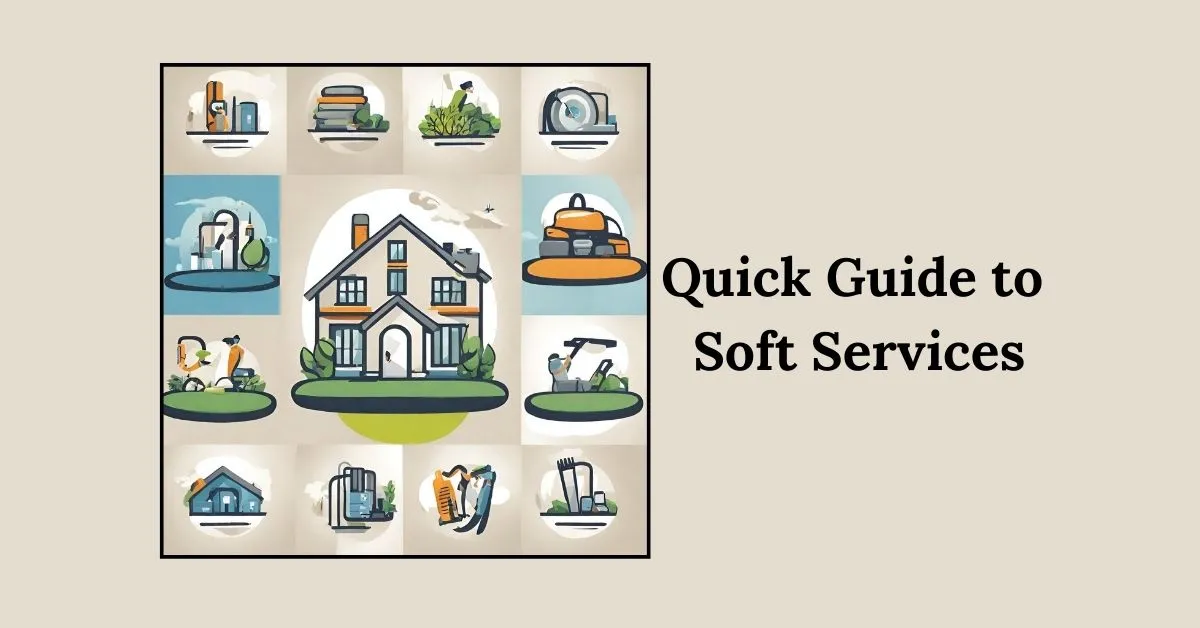
Quick Guide to Soft Services: Accelerating Your Business Success
In a business context, soft services refer to essential support functions that enhance the core operations of an organization. Unlike hard services, which are tangible and infrastructure-focused, soft services are intangible and primarily aim to improve workplace aesthetics, functionality, and overall experience.
These services provide critical support to ensure a productive and comfortable work environment. It includes many services such as:
- Housekeeping: This is a vital service to ensure workplace cleanliness and hygiene.
- Landscaping: This service helps maintain outdoor spaces, including gardens and lawns, which create an aesthetically pleasing environment.
- Security Service: A critical service that ensures the building and occupants' safety.
- Hospitality Service: This helps enhance the employee and visitor experience.
- Administrative Services: This includes administrative tasks such as handling mail, document control, etc.
- Pest Control: This is important to prevent infestation and maintain a healthy workplace.
- Waste Management: Unlike housekeeping, waste management helps handle waste from its origin to disposal. Plus, it ensures sustainability and environmental compliance.
- Catering Services: This particular soft service is responsible for providing food and beverage arrangements that enhance employee convenience and satisfaction.
In addition to these, there are some other soft services in organizations, such as transportation, event management, etc. Companies should properly conduct these services to run the business's primary functions smoothly.
Importance of Soft Services for Business Success
Business success comes along with achieving goals and enhancing the primary business function. Enhancing a business’s primary function is only possible by properly performing non-core business functions (supportive services).
A business has two primary supportive services, such as “soft services” and “hard services”. They support comprehensively in enhancing the core business function of an organization. It's vital to pay adequate attention to performing soft services in a building.
Moreover, these services provide several benefits to a business when they're performed to the standard level. Simply, they help attract more customers, improve building aesthetics, reduce incidents, and bring many more advantages. It's clear that soft services help achieve business success.
Understanding Soft Services
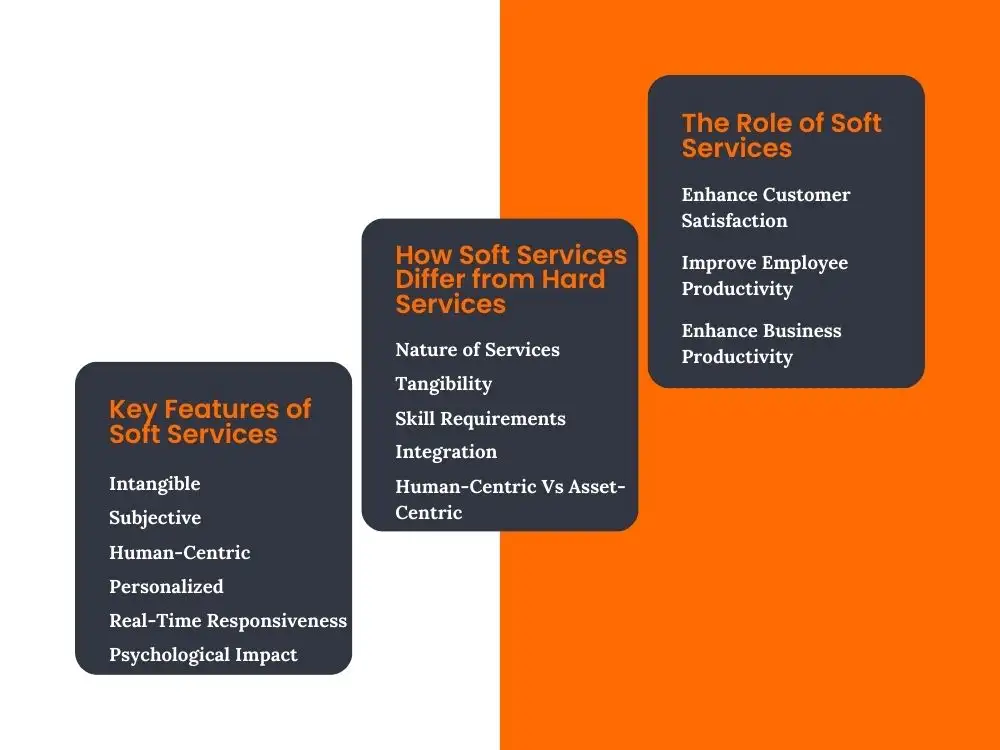
Key Features of Soft Services
Generally, it encompasses many key features that assist in enhancing a business’s customer experience, employee satisfaction, and a pleasant work environment for visitors. Here are some key features of soft services:
- Intangibility: They are not tangible like physical products, and they mainly deliver support to the business's core function.
- Subjectivity: Soft services are based on subjective experiences and perceptions of customers, employees, and visitors. It may differ from person to person, and a common standard of service provision is necessary.
- Human-Centric: They are highly dependent on human influence, where individuals’ skills impact the level of service provision.
- Personalization: Soft services are customizable to meet individual requirements and preferences. It can be tailored to cater to the specific requirements of a person, which enhances attachment.
- Real-Time Responsiveness: They respond in real-time by fulfilling the requirements of individuals without delays. Quick responses to soft services are crucial to building business success.
- Psychological Impact: They have a significant impact on individual psychology, where a pleasant work environment, prompt administration, and swift service delivery can make a huge psychological impact on individuals.
Understanding these essential features helps deliver a standard level of soft services. Plus, it eventually leads to positive business functions and success.
How Soft Services Differ from Hard Services
Since both soft and hard services are important supportive functions for a smooth business operation, they differ in the following features:
- Nature of Services: Soft services mainly focus on improving individuals’ well-being in an organization by providing necessary services such as housekeeping, catering, security, etc. On the other hand, hard services focus on improving a business's physical infrastructure and facilities, thereby supporting the core business. Some examples of hard services are conducting facility maintenance, which includes the management of HVAC, energy, necessary repairs, and refurbishments.
- Tangibility: Soft services are intangible and they only involve communication, interactions, and support to enhance business functions, while hard services are tangible and involve physical asset maintenance and repair.
- Human-Centric Vs Asset-Centric: The purpose of soft services is human-centric, which concerns enhancing human satisfaction, while hard services are asset-centric, which concerns increasing asset lifecycle, performance, value, and so on.
- Skill Requirements: Soft services need necessary skills like excellent communication, customer service, and interpersonal skills from employees who perform those tasks, while hard services need necessary technical, asset management, and other specified skills related to the service.
- Integration: Based on the service category, the organization categorizes the integration. Soft services are more likely to be integrated with divisions that are human-centric, like administration, HR, and soft FM divisions, while hard services are more likely to be integrated with technical and engineering divisions to perform the tasks better.
The Role of Soft Services in Enhancing Business Operations
Soft services play a pivotal role in enhancing business operations, as they enhance the overall satisfaction of customers, employees, and other individuals in a business environment.
An effective service provision ensures a clean, safe, and pleasant working environment for the occupants, which is a direct contributor to increasing employee productivity, customer loyalty, low accident rates, flexible culture, brand reputation, and many other factors that are important to a business.
They also help businesses enhance their operational standard by ensuring these essential factors. Plus, it reduces issues that are possible from a bad reputation, low productivity, increased accident rates, less loyal customers, and so on.
The Impact of Soft Services on Business Success

Improving Customer Satisfaction and Experience
Soft services help improve customer satisfaction and experience in different ways. Customers expect better service, feedback, quality, and many other vital aspects. These are perfectly fulfilled with the right service provision. In return, it results in enhanced satisfaction and more loyal customers for the business.
For example, A hotel needs to provide soft services like good hospitality, a nice reception culture, clean rooms, safe access, elegant catering, and quick service. These are essential to increase a good customer experience.
Moreover, satisfied customers will always return to consume the service. This is a good sign for business success and continuity.
Enhancing Employee Productivity and Well-being
These are essential elements for a business's success, and an organization's soft services directly impact work productivity and well-being.
If a business environment is unsafe, dirty, without adequate welfare, and with improper administration, then that falls under bad soft services. This may lead to a lower level of employee productivity and business losses.
On the other hand, if an organization considers delivering appropriate soft services such as a safe, clean work environment with adequate welfare, good working culture, and administration, then it helps enhance employee productivity and well-being, which leads to a successful business.
Fostering a Positive Organizational Culture
The soft services of a business foster a positive organizational culture, which mainly focuses on enhancing individuals’ perceptions and experiences regarding business functions.
Customers, employees, visitors, and other general occupants of a business have personal perceptions regarding the business functions. Therefore, a good soft service provision never fails to satisfy the requirements of individuals, which helps enhance the organizational culture.
This positive organizational culture makes a significant impact in leading the business to a successful venture in the industrial market.
Driving Long-term Business Growth and Loyalty
This is very important to sustain in the market, where soft services ensure these goals by providing necessary services and enhancing individual satisfaction. Loyal customers, brand reputation, employee productivity, and visitor experience are some important factors to drive long-term business growth.
A business should deliver the best soft services to ensure these factors. The overall value of an organization stays at the standard level of these soft services. So, businesses should focus on creating additional value to establish growth and loyalty.
Implementing Soft Services in the Business
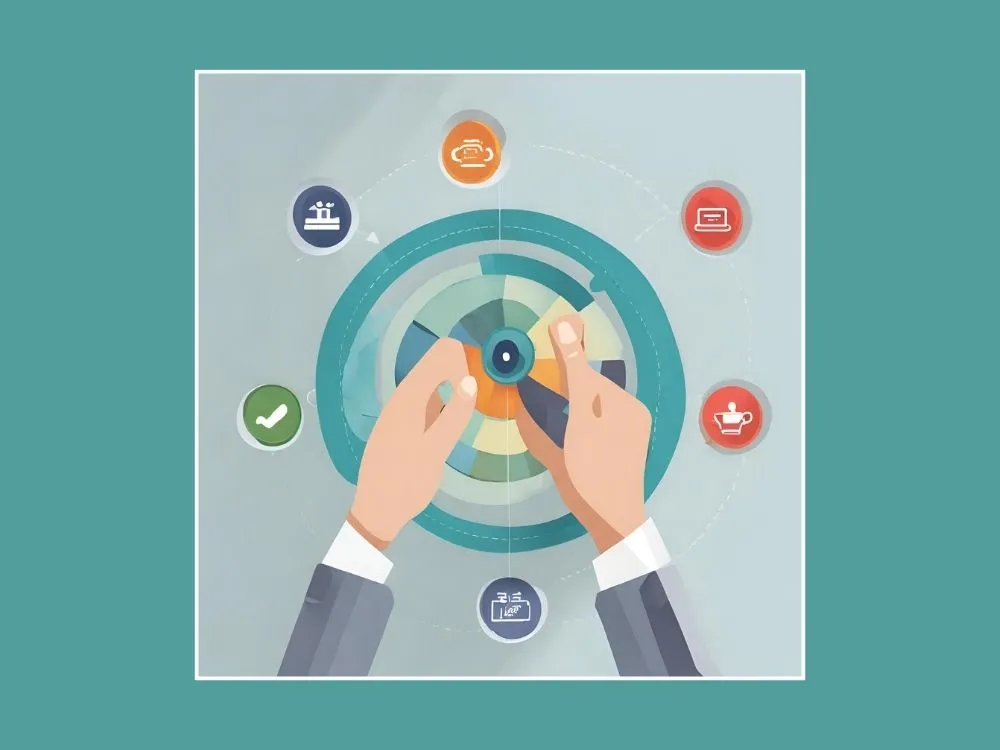
Assessing Business Needs and Goals
This assessment is one of the main elements before implementing soft services in a business. It's necessary to understand the unique requirements of the organization, which is helpful to match services based on those requirements. Assessing business needs and goals incorporates:
- Identify Pain Points: It's mandatory to conduct a thorough evaluation of business operations to identify pain points or challenges in incorporating soft services. This helps address the challenges perfectly.
- Set Clear Objectives: It's vital to set clear and smart objectives when implementing these services. This helps a strategic approach to match specific business needs and goals. Whether it can be improving workplace safety, providing customer satisfaction, enhancing employee well-being, or any other objectives that should be clear and smart.
- Solicit Feedback: Getting feedback from relevant peers or parties in the organization regarding the soft services is crucial for better service implementation. By getting feedback, an organization acquires information regarding individual expectations. This helps align business needs and goals.
- Budget Considerations: Assessing budget requirements for implementing these services is inevitable. An organization's financial resources should be enough to provide soft services as per the business needs and goals.
Identifying Appropriate Soft Services for Your Industry
Businesses have to identify appropriate service requirements based on their industry. This is paramount to match the services with specific needs. Conducting detailed research is crucial to identifying what kind of soft services are necessary for the business.
This is also helpful to avoid spending on unnecessary services. For example, a healthcare organization doesn’t have any requirements for catering services like hotels do. According to the type of industry, the requirements for soft services differ. So, organizations should identify these requirements for better service implementation.
Key Soft Service Solutions

Housekeeping
This is one of the most crucial soft services that ensure cleanliness, aesthetics, and a pleasant working environment for a business. Housekeeping ensures every important area of an organization is clean and safe for access and exit.
It enhances the overall quality of a business and lets people feel pleasant visiting the premises. Every business should give proper attention to this vital service, where irregularities in this service provision may lead to many problems.
It can be anything like lower employee productivity, a bad reputation, customer losses, increases in accident rates, and several others. Therefore, housekeeping should be planned well and performed with diligence to support the primary business functions.
Landscaping
Landscaping is another important soft service, considering designing, planning, and enhancing outdoor space functionality and aesthetics. Landscaping involves several things, such as:
- Planting Trees and Flowers
- Arranging Seating Areas
- Creating Pathways, gardens, lawns, and many more things
It helps enhance the outdoor area of a company and significantly improves the occupants’ satisfaction. It also beautifies the business premises for a better feeling. Proper landscaping helps with easy access and leaving. This is vital to create the best impression for business success.
Security Services and Access Control
These are essential services that protect the organization from unauthorized access and threats. There are different kinds of security services in a building, such as surveillance cameras, trained security personnel, alarm systems, access control systems, and many more.
These security services ensure business safety from any kind of potential threats. For instance, in organizations, employees are given proximity access cards, and other visitors go through normal security screening for safety.
For example, a grocery store contains metal detectors and surveillance cameras to detect theft and threats, while employees may have been given access cards or other identities to enter and exit the premises.
Hospitality and Concierge Services
Mostly in the hotel sector, these hospitality and concierge services are necessary that create a good customer experience and let customers come back. This soft service particularly involves warm welcoming, swift assistance to customer complaints, providing good facilities or services, quick information sharing, and other related services.
This is important to enrich the customer and visitors' experience. Therefore, this soft service helps organizations increase customers and retain them for longer periods, which leads to business growth.
Administrative and Support Services
Administrative and related support services are vital soft services that directly help enhance the business's core function. Generally, it includes managing leave excuses, data entry, scheduling, HR, IT support, accounting, and other related tasks.
These are important to maintain business operations and to improve customer, visitor, and other relevant parties’ satisfaction. Through efficient administrative and support services, an organization can improve its productivity and gain competitive advantages.
Businesses should consider delivering standard administrative and related support services that help grow the business by a greater margin.
Measuring the Impact of Soft Services
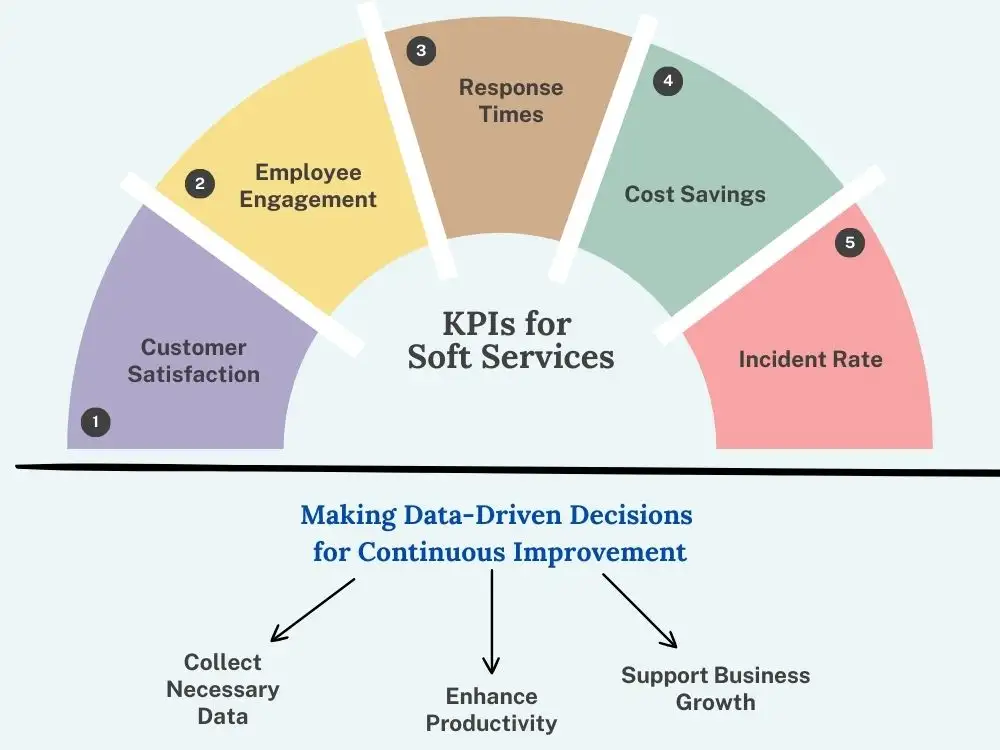
Key Performance Indicators (KPIs) for Soft Services
It's vital to measure the performance of these soft services. Key performance indicators (KPIs) play an important role in measuring the impact. Some essential KPIs to evaluate the impact are as follows:
- Customer Satisfaction: Conducting surveys and feedback helps identify how well the soft services satisfy the customers of a business. Plus, a good rate indicates that the service provisions are meeting expectations.
- Employee Engagement: Surveys and appraisals conducted among employees help identify employee engagement. These surveys include how supportive these services are, their efficiency, and engagement rate. When the service provisions are at a standard level, the employee engagement rate will be high.
- Response Times: Based on the response time of the service, the outcome differs. It's a paramount indicator to measure the performance of soft services in an organization.
- Cost Savings: Efficient services lead to cost savings by mitigating operational expenses. Therefore, cost savings is a good KPI to measure the performance.
Several other KPIs are used based on the industry to measure the impact of soft services. This includes customer retention, incident rate, compliance metrics, and many more. Measuring these KPIs assists businesses in gaining useful insights about their service provision, and when necessary, they can make changes based on that.
Making Data-Driven Decisions for Continuous Improvement
Making proper decisions is vital to improving business performance. Organizations collect and analyze necessary data related to their soft services provision, such as customer satisfaction, employee engagement, visitors’ perception, and many other important insights.
This approach helps them make clear decisions for continuous improvement. Further, businesses closely monitor their KPIs and other performance metrics to track their progress. This helps make timely adjustments in their strategies.
Overall, a data-driven decision-making approach is fruitful in enhancing productivity and supporting business growth.
Overcoming Challenges in Implementing Soft Services

Budget Constraints and Cost-Effectiveness
Implementing soft services in an organization needs an adequate budget. Sometimes organizations face challenges in raising this budget for their service implementation. It’s a costly overhead that leads many organizations to prefer outsourcing these services to a third-party contractor.
Outsourcing budget is high, but at the same time, firms acquire the best talents or skilled professionals to perform the tasks. In addition, all services require inventories and equipment costs that companies should bear.
Example: A business outsources its housekeeping to an external service provider, where they have to bear costs like contractor fees, salaries for contractor employees, inventory costs such as housekeeping chemicals, cleaning appraisals, etc.
Bearing these facts in mind, organizations successfully evade this budget constraint challenge by conducting research and analysis of soft service requirements with optimum service costs. Plus, selecting the best vendors for procuring inventories is important. This saves a considerable amount and enhances the service provision too.
Integrating Soft Services with Existing Business Processes
Businesses sometimes find difficulties in integrating soft services with existing business processes. To establish a seamless experience, these services should be integrated with the business processes in the finest way.
Based on the industry, the business processes differ. So, it is vital to match service provision with the business processes. For example, a manufacturing business firm needs more rigorous cleaning requirements than a normal office building. Likewise, a healthcare firm needs more immediate patient (customer) care than any other business.
According to the industry requirements and their business processes, the challenge of integrating the soft services differs. Therefore, every business should take this as an important measure to ensure the integration in the best possible condition.
Tips for Choosing Reliable Soft Service Providers
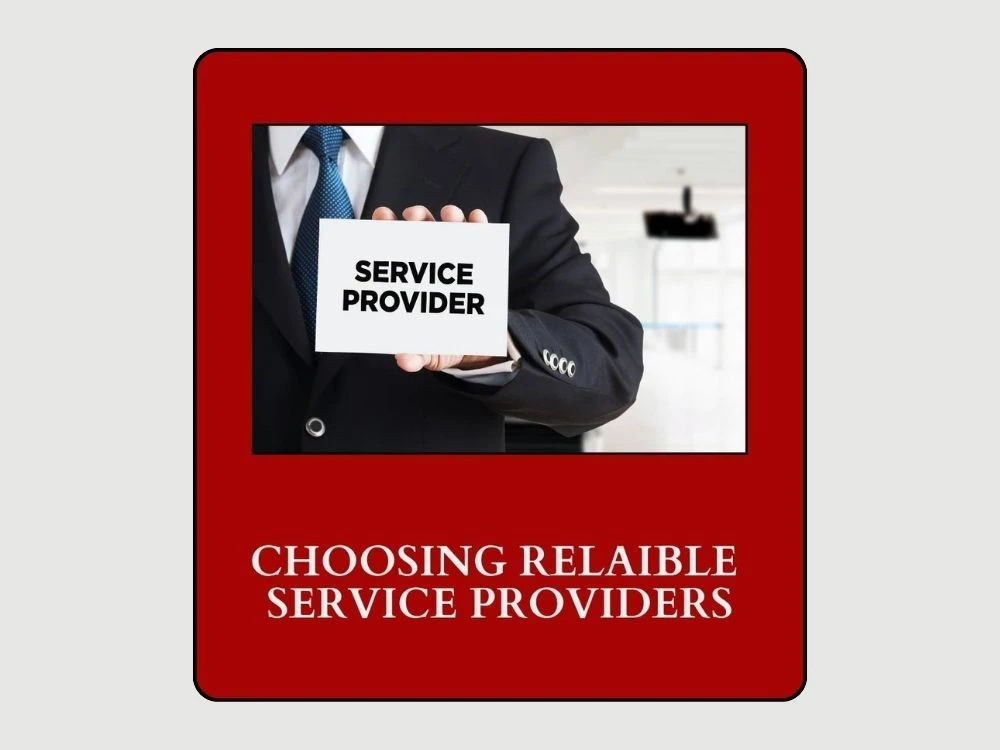
Researching and Evaluating Potential Service Partners
Choosing reliable soft service providers is crucial for businesses where the success of a business is highly influenced by the level of service provision. To identify the skills and competency level of the service providers, companies need to conduct thorough research.
There may be several service providers in the market who can provide the same services to the business. So, evaluating their potential is crucial based on various factors like:
- Past Service Records
- Success Rate
- Quality of The Service
- Trustworthiness
- Communication
- Response Time
- Delivery Duration
- Contractual Price, offers, discounts, and many other important factors
Requesting and Comparing Quotes and Proposals
Requesting proposals and quotes from contractors or service providers is important to check and compare the features. This mainly includes features like price, quality, delivery time, competency, and other norms and stuff related to the service provision of a company.
It's mandatory to deeply analyze the submitted quotes and proposals to comprehend the contractors' service level. This is vital to proceed with agreements between contractors and the business. You have to do this before choosing the service providers that ensure a better service level agreement (SLA) and service.
Wrapping Up
Soft services are crucial for business success and offer intangible support like housekeeping, security, hospitality, and many others. Understanding their features, such as personalization and real-time responsiveness, helps establish a positive organizational culture.
These services influence customer satisfaction, employee productivity, and the long-term growth of a business. Measuring the soft services using KPIs and data-driven decisions ensures continuous improvement.
Additionally, overcoming challenges like budget constraints and service integration with existing processes is vital. Choosing reliable service providers through research and comparing proposals lets businesses protect themselves from incompetent contractors.
FAQs
Q1: What are the key features of soft services?
Key features are intangibility, human-centric nature, personalization, and real-time responsiveness.
Q2: How do soft services differ from hard services?
They differ from hard services in various ways. One such way is that these are human-centric, whereas hard services are asset-centric.
Q3: How can businesses measure the impact of soft services?
Through key performance indicators (KPIs) like customer satisfaction and cost savings.
Q4: What are the challenges in implementing soft services?
There can be certain challenges, like budget constraints and integration with existing processes.
Q5: How can businesses choose reliable soft service providers?
Businesses do thorough research and evaluate proposals to choose the best service providers in the market.
Explore Related Articles
https://smarttoolsai.com/post/how-retail-business-services-drive-growth-and-profits
.webp)